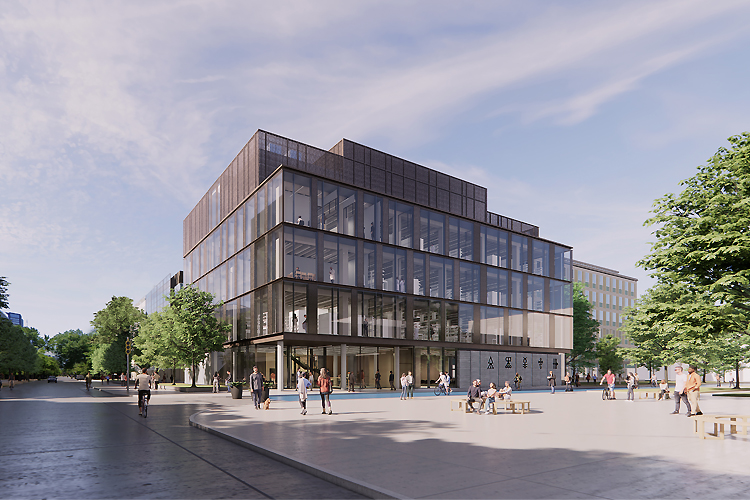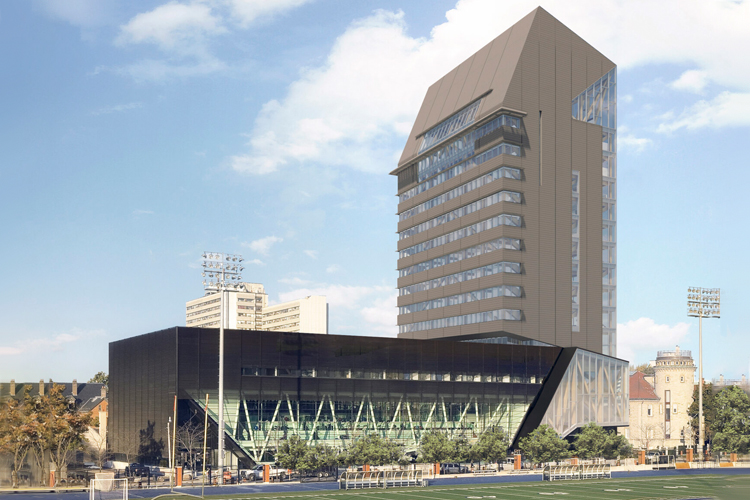As we head into spring, Dean Melanie Woodin is pleased to report that the Faculty of Arts & Science community is making incredible progress on the many goals set out in its ambitious five-year academic plan. Entitled Leveraging Our Strengths, the 2020-25 plan was developed as an essential blueprint to guide the faculty in fulfilling its core objectives.
“We’ve seen amazing commitment in every corner of the faculty,” says Dean Melanie Woodin. “I’m really pleased with our progress to date and that we are responding to the priorities we set, while keeping pace with new developments in teaching and research, and the services needed to support students.”
Since 2020, several new initiatives have been implemented to provide undergraduate students with a more holistic educational experience, such as the launch of the Arts & Science Internship Program and expansion of digital learning in the faculty.
“Opportunities for learning while doing are important to the student experience, and it is a priority for us to expand and create meaningful programming in this area,” says Woodin, “whether that be in the classroom, in the field, or in international settings.” To support these ambitions, A&S joined the Faculty of Applied Science & Engineering and U of T Student Life to open a new Experiential Learning Commons in the fall of 2023 — a welcoming new space dedicated to student-oriented professional development, work-integrated learning activities and for networking with employer partners.
The faculty’s academic mission continues to be supported by the breadth of research and teaching across 74 diverse academic units. Over the life of our current plan, four units have transitioned to a new “EDU” status, enabling them to broaden their strategic and teaching impacts. And most recently, two of those units — the African Studies Centre and the Centre for Caribbean Studies — will now receive a generous $5-million boost from A&S alum Richard Rooney (BA 1977 NEW), propelling their vibrant areas of learning and research to even higher levels of excellence.
Pushing the boundaries of research excellence has also been an essential priority, as several new developments in the faculty have shown.

“U of T is one of the top research institutions in the world,” says Woodin. “Here at A&S, we drive much of that research.”
“Just one example is our seeding and support of the Acceleration Consortium’s application for the Canada First Research Excellence Fund,” added Woodin. “In 2023 they received the largest federal research grant ever awarded to a Canadian university, and are already making significant progress, recently announcing several impressive projects to accelerate scientific discovery.”
Also on the research front, A&S developed its first Strategic Research Plan, which outlines our vision and priorities for supporting and advancing research over the next five years. The plan builds on several initiatives recently announced, including the Eric and Wendy Schmidt AI in Science Postdoctoral Fellowship, a program of Schmidt Futures, which granted $10 million as part of its global program over the next six years.
Woodin says that during this third decade of the century, innovations in teaching and learning technologies continue to develop at an exponential rate.
In keeping with the rapid pace, A&S launched the Digital Teaching and Learning Studio in 2023 to provide instructors with the equipment, space and personnel to develop and produce high-quality video and audio content; the faculty also facilitated informational talks related to generative artificial intelligence (AI), including with the “godfather of AI” Geoffrey Hinton. To achieve its ambitious goals, A&S has also identified the continuing need for strong infrastructure and operational supports — and is moving forward on significant capital projects.

Construction has begun on the Academic Wood Tower Project, which will support graduate students, teaching, research, and faculty-member expansion within the Munk School of Global Affairs & Public Policy. The Lash Miller Expansion Project broke ground to provide research labs and support space for the Acceleration Consortium and classrooms, as well as laboratory space for the Department of Chemistry. Innis College also has embarked on an student-focused expansion that will create a modern student learning centre, library, computer lab, dedicated areas for student activities, and revitalized common spaces.
Woodin’s reappointment was announced last fall, and she says she is very proud of what the faculty has been able to do especially during the COVID-19 pandemic and significant global issues that continue to impact our community.
“We set out to accomplish many objectives and we have more to do. It also isn’t possible to predict everything that we, and our sector, will face in the coming years,” says Woodin. “That said, having a well-rounded academic plan has positioned us to be nimble and adaptive as we continue to work toward all that we can achieve together.”
Read last year's progress update and find more information on the 2020–25 academic plan and progress to date.

